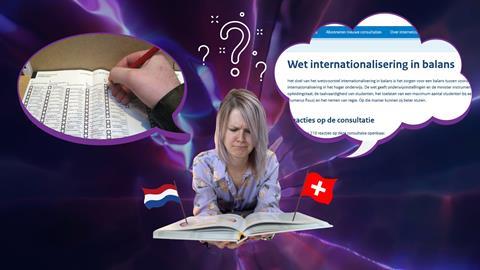
Isabelle Kohler reflects on the aftermath of the Dutch elections and shares her worries about the Balanced Internationalization bill.
I’m writing these lines on Thanksgiving Day, a day that is traditionally celebrated with a big feast shared with family or friends. This year, it also marks the aftermath of the Dutch elections. To be honest, I’m not in the mood for celebrations. I feel similar to the day in February 2014 when Switzerland backed immigration quotas, or when the far-right politician Jean-Marie Le Pen reached the second round of the French presidential election in 2002. I feel sickened.
I also feel frustrated: as a non-Dutch citizen, I can’t vote. It’s ironic that I can still vote in Switzerland, a country I left a decade ago, but have no say in the decisions that shape my daily life in the country I now call home. ‘But why don’t you take Dutch citizenship then?’, you might argue. You’d be right, except that I’d have to give up my Swiss passport, a choice I’m not prepared to make while I still have family in Switzerland.
I’ve spent nearly ten years of my life in the Netherlands. During that time, I’ve learned the language, paid my taxes, and contributed to the education of future analytical chemists and pharmaceutical scientists. Nevertheless, the feeling of being an outsider remains. I feel like a free electron.
The election results aren’t the only thing on my mind lately. As a ‘free electron’ involved in higher education, I’m also worried about the Balanced Internationalization bill (Wetsvoorstel Internationalisering in balans) proposed by Minister of Education, Culture and Science Robbert Dijkgraaf, which aims to achieve a better balance between the advantages and disadvantages of internationalization in higher education. For those who aren’t familiar with this bill, it was born out of concerns about the ever-increasing number of international students, resulting in pressure on accessibility of education, overcrowded lecture halls, additional work for lecturers, and a lack of student accommodation in large cities.[1]
Amongst other things, the bill contains measures to promote the use of Dutch in higher education. For example, it requires that at least two-thirds of the total number of credits in a bachelor’s program must be taught in Dutch.[1] Given that 46% of academic staff come from abroad [2] and only a minority of them are able to teach in Dutch, this means that either education will become more dependent on fluent Dutch speakers or universities will employ fewer international staff. Both options are clearly dangerous for the future of education and research in the Netherlands.
I don’t understand the discrepancy between academic aspirations and political visions. How can we promote the international mobility of academic researchers and at the same time encourage bachelor’s and master’s programs to be taught in the national language? How can we guarantee cutting-edge and groundbreaking research in the Netherlands if we don’t actively integrate global talents into our research and academic communities? Sometimes I wonder if people realize what it means to move from one country to another. No, learning a new language doesn’t happen overnight – especially in a professional environment where overwork is the rule rather than the exception. This is also emphasized by the Universities of the Netherlands (UNL) in their response to the bill: ‘The Dutch language level has to be very high if Dutch-language teaching of acceptable quality is to be provided; it is not something that a non-Dutch speaking lecturer engaged in an international field of research can learn in a couple of years.’[2]
I feel tired. I feel tired, together with all my international colleagues, students and friends who also didn’t feel like celebrating last week. But as an optimistic free electron, I also feel hopeful when I see the reactions of the scientific and academic community to the Dutch elections and the Balanced Internationalization bill. The Dutch chemistry and life sciences landscape needs international researchers and lecturers to guarantee high quality education and competitive research. I don’t think we want to face similar consequences as Switzerland with its 2014 referendum on restricting immigration from the EU, which resulted in reduced access to the EU’s Horizon2020 and Horizon Europe funding program, fewer university-industry partnerships, and the relocation of international talents that could no longer work in Switzerland. We have to be careful and aware of the long-term consequences of such political decisions.
Chemistry is about connecting atoms. Let’s make sure that we continue to foster the connection between each individual in our community too – regardless of their nationality(ies) and language(s) spoken.
References:
[1] https://www.internetconsultatie.nl/internationaliseringho/b1 (accessed 26th November 2023)
[2] Input from the Universities of the Netherlands (UNL) for online consultation on bill for a balanced approach to internationalization, https://www.uva.nl/binaries/content/assets/uva/en/news-and-events/def-input-unl-wetsvoorstel-internationalisering-in-balans—en.pdf (accessed 26th November 2023)
PS: If you’re interested in joining an inclusive community and learn more about working as an international in academia, don’t hesitate to join the NextMinds Community! For this, you have plenty of choices: visit NextMinds website to learn more about my work, sign up to the monthly newsletter, and follow me and NextMinds on LinkedIn.

















Nog geen opmerkingen